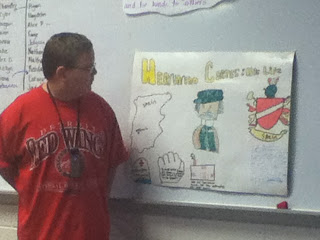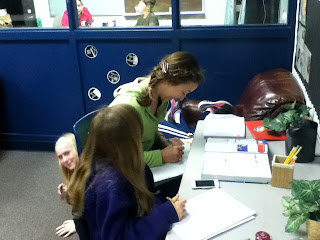This summer I attended 2 professional development opportunities through my district. While they both relate to each other, I'm having a hard time meshing them. In the past, I've found that once I begin writing, often times I'll figure out a solution...therefore I give you what is potentially going to be a very rambling blog post.
Training #1 - Leadership Blueprint
The first training I attended was about developing leaders in the district...or so I thought. We did, in fact, develop some strategies for being leaders, but most of those revolved around learning how to build relationships. The power of having relationships with whomever you're working with (students, parents, teachers, principals, etc.) is HUGE. I should also preface this part of the post by giving kudos to everyone in my district who attended. There was a room of 32 adults, and they consisted of: the superintendent, curriculum director, all principals and assistant principals, director of technology, head of maintenance, many teachers AND a school board member. Throughout the duration of the 3 day training everyone was engaged & involved...no one was checking emails, texts, etc...it was a beautiful thing.
One catch phrase that kept coming up was "My goal is your success." The goal of a leader isn't their success, it's the success of those they work with. The biggie here, is you have to mean it. You can't say something like that, then never DO anything to back it up (aka - walk the talk). I also had a bit of a light-bulb moment during the training. I am used to teachers being given feedback by administrators to help us grow. What I hadn't ever thought about was giving feedback to my administrator. I never thought of it as my responsibility to help my administrators grow, but I'm realizing that if the people working for them can't give them honest feedback, then they will never change. This year I intend to be honest with my administrator, and hopefully we can help each other be successful.
Affirmation also became a big topic of discussion. I have a very hard time receiving affirmations with a simple "thank-you". I always feel like I need to justify what I did. This is a goal of mine, to simply say "thank you" when someone says something kind. I also want to give more meaningful affirmations. Two things I'm going to take back to my classroom from that portion of training are
affirmation bags and classroom "
good things". Once I've developed a relationship with my kiddos we'll start affirmation bags with each other...basically anonymous notes filled with affirmations. One thing I'll start day 1 is our classroom good things. Each morning, while we have breakfast, I plan on just calling out 5 people for good things...good things at home, good things at school, whatever. Being the obnoxiously optimistic person that I am, I want the day to start in a positive way.
Another part of our training that I will definitely be doing with my class is a social contract. A social contract is an agreement of behavior. As of now I have an empty bulletin board that says "Social Contract...it's how we treat each other". We'll be filling it in as a class. I've done similar things in the past, but this year I'm going to change something...I'm going to remember to actually go back to it & even change it, if necessary. Along with the social contract came 3 hand symbols that I LOVE. Thumb up is a reminder to a neighbor who isn't paying attention (I got to use this on my principal...he, he, he), Time out is a reminder to the group as a whole if there is side chatter, and Foul (one hand up, one hand out) is if you hear someone give a put down (to themselves or others). If a foul is called, then whoever said it must immediately say sorry & give a put up.
Training #2 - Curriculum Design & Development
My district is in the very early stages of being the first school district in Michigan to go to a completely mastery based system of grades. We voted, as a district, last year, and 81% of voters supported this move. With it comes a HUGE shift in thinking about how you run your classroom, how you teach, and how you think about your students. I just finished 3 days of introductory training on the RISC (Re Inventing Schools Coalition), and it was good...I hesitate to say it was great, only because there was a lot of talking at us. I also realize that there needs to be a certain amount of knowledge being passed down to us, especially when we're beginning.
The most beneficial part of the training was the work time. We got a chance to work in buildings and grade levels on some of the changes we need to begin making. In grade levels we began unpacking standards, turning them into kid-friendly language, and thinking about rubrics that show mastery...we have LOT yet to do.
As a building we got a lot of time to solidify our building wide procedures, expectations, vision, etc. We used to have a very wordy vision for our building...no one really knew what it said (even though we all had input on it), and we needed a change. I'm really excited about what we came up with:
Alpine: Be the Best You
We then took the word BEST from our vision and turned it into our expectations.
Be a leader
Excellent
Safe
Trustworthy
We even have a building song (thank the lord for musically gifted teachers, because our Kinder teacher came up with it in less than 5 minutes).
We also got a lot of work done on the building wide procedures. One of our issues is that we have procedures, but they're different in every room. We came up with simple, kid friendly procedures that everyone will use.
I think the most powerful part of it all was that our principal wasn't the one directing us to do all this work. We, the teachers, recognized the issue. I know it was probably extremely difficult for him, but he managed to sit back & let us take control of all of it. The only time he stepped in was when we needed to share what we did with each other.
When I spoke at the beginning of this blog about having a hard time meshing the trainings, it was mostly my desire for wanting to do a social contract, but also stay consistent with the other teachers within the building. Like I expected, I've sort of worked it out now that I'm done typing. I'm realizing the social contract is the behaviors within my class, the relationships I build with my students. The procedures and vision expectations are the common language throughout the building.
I'm excited for the year and developing a community within my classroom, and I'm even looking forward to getting more time to work more on our grade level unpacking.
So bring it on kids, let's get this party started!












































